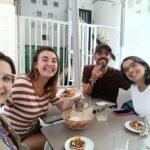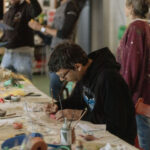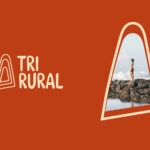Some months have passed, specifically April, since the last post blog I wrote here to talk about 'undertake from rurality.'
On the last occasion I told you about three projects directly linked to the Earth and that is that the primary sector (and that there are entrepreneurs who continue to bet on it) is of vital importance for all of us.
Such basic issues as permaculture, planting in an ecological way or achieving a certain level of food sovereignty will be one of the bases of our future.
That link with the earth becomes more latent with a specific crop when the month of September comes: the vine . September (if climate change allows us) is the month of the harvest in many corners of Spain and that harvest is what tells us that within a few months we will have new wines in our wineries.
It is curious to see how throughout my working life, wine has been present in many projects, or moments. I did my university practices in a denomination of origin of the island of Tenerife and that was where I discovered the cultural importance that this cultivation has for our islands.
A value that goes far beyond the cultural
Thanks to having a slightly broader perspective, when I think of the wine, it did not visualize the bottle, but I visualize all those landscapes that build and sculpt many of the corners of our geography. From immense fields that go to where he loses his sight, through the small rates that form vines stairs in many ravines or slopes of the Canary Islands.
In addition to the peculiarities of the land, they are added how to plant the vine we have for some of these lands. crops holes Lanzarote, to protect the grapes of the intense wind that plagues the islands, or shaking cord , a traditional way of cultivating typical of the orotava (in the island of Tenerife) and unique in the world. From here, there are multiple forms of crop, each peculiar of its territory and that make it possible for more mechanization to be introduced in the process, or that on the contrary, everything has to be done manually.
As you can see, the vine is more than the elaboration and production of a product such as wine, it is part of the culture and landscape of its regions, and therefore, they are also a phenomenon of tourist attraction and economy generation linked to the sector.
Three way of seeing and understanding viticulture
As you will already assume, within this article I will present you to three rural entrepreneurs (already their projects) linked to the world of viticulture. All of them have been part of our experiences of Rural Coliving and, of course, of the connected rurality:
-
Victoria Torres (Bodegas Victoria Torres Pecis) : Victoria is passionate about wine and viticulture, you just need to have a conversation with it to understand the knowledge of the earth, the pampering (and dedication) that knows that it has to give it and the type of broths you want to produce. Its wines are considered among the best in the Canary Islands and proof of this is that its production usually exhausted, exporting to countries like the United States or Japan. All the elaboration of wine that produces does so one hundred percent natural, without any additives.
-
Víctor Rolo (Bodega Cambium) : Victor is another passionate about wine, to such an extent, that his work and his hobby are viticulture. Cambium was the first ecological winery with which we worked in remote villages and with it we learned a lot of how wine is elaborated, how to grow a vine without using chemicals or how you can live with so much passion for dedication to this crop. Victor's wines are of excellent quality and shows this is that they have more and more representation in the Canarian market.
-
Diego Barrera (wine and land project) : Diego lives wine, is the phrase with which he could best describe it. From the little pieces of land of his family (as he would say) to any variety of wine that passes through his hands, Diego always shows his passion for it. With wine and land, its Side Project Diego does activities to show the importance of this crop, tell you curiosities about it, make pairings and above all, to taste and taste it. The passion and performance that it puts with it is worthy of admiration.
From left to right: 1) Activity at the Victoria Torres winery | 2) Wine tasting activity in Cambium winery | 3) Diego decorchating a bottle of wine during an activity with wine and earth.
Well, so far the third post blog of the series: 'undertake from rurality', within it I wanted to convey the importance of a sector such as winemakers. In the next articles I will continue talking about incredible projects, which maintain the traditions of small corners of our land.
Of course, I encourage you to share this post blog since you subscribe to our newsletter to receive the new ones directly in your inbox.









